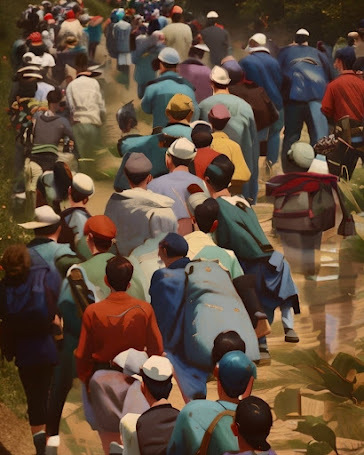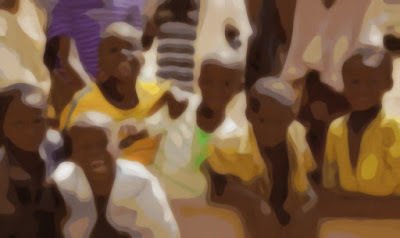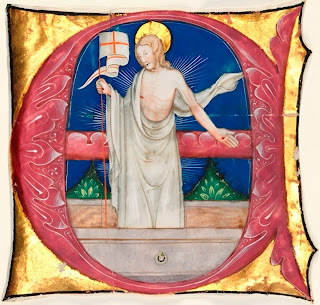We Must BE VIGILANT to See the Fullness of Human Dignity
 The Gospel for the First Sunday of Advent sets a crucially important tone for our Advent expectation, reminding us that we belong to Christ, that Christ is our hope. We are called to lift up our hearts to Him, to recognize our true identity and destiny in Him. Advent is a time to “stand up straight and raise our heads” in expectation of Christ’s coming, and the fullness of our redemption which will reveal the truth of every moment of our lives—the total meaning of our history and the joys and sorrows, the gifts and creative engagements, the suffering and endurance of our lives. This particularly intense Gospel passage deserves our meditation and reflection:
The Gospel for the First Sunday of Advent sets a crucially important tone for our Advent expectation, reminding us that we belong to Christ, that Christ is our hope. We are called to lift up our hearts to Him, to recognize our true identity and destiny in Him. Advent is a time to “stand up straight and raise our heads” in expectation of Christ’s coming, and the fullness of our redemption which will reveal the truth of every moment of our lives—the total meaning of our history and the joys and sorrows, the gifts and creative engagements, the suffering and endurance of our lives. This particularly intense Gospel passage deserves our meditation and reflection:Jesus said to his disciples: “There will be signs in the sun, the moon, and the stars, and on earth nations will be in dismay, perplexed by the roaring of the sea and the waves. People will die of fright in anticipation of what is coming upon the world, for the powers of the heavens will be shaken. And then they will see the Son of Man coming in a cloud with power and great glory. But when these signs begin to happen, stand erect and raise your heads because your redemption is at hand.
“Beware that your hearts do not become drowsy from carousing and drunkenness and the anxieties of daily life, and that day catch you by surprise like a trap. For that day will assault everyone who lives on the face of the earth. Be vigilant at all times and pray that you have the strength to escape the tribulations that are imminent and to stand before the Son of Man” (Luke 21:25-28, 34-36).
This season invites us to “run forward to meet” Jesus Christ who was born into this world, who lived and died for us, who conquered sin and death and is risen in His glorified humanity to draw all things to Himself. We are exhorted to “run forward to meet” Christ who comes to each of us in this moment, now, to empower us to see that the promise and the measure of this moment—of every moment—is His dwelling-with-us as the wondrous, unforeseen, incalculable gift of the Father’s infinite mercy and love.
We are also reminded to be vigilant and awake with welcoming hearts, with the hope and love that the Holy Spirit stirs up and sustains in us, and to guard against losing our focus on the face of Jesus. Advent reminds us that we must not allow our minds to be “weighed down” by distraction, discouragement, or forgetfulness of our supernatural destiny as co-heirs with Christ in the Kingdom of His Father.
The vigilant expectation of Jesus Christ “coming to us” and “dwelling among us” must be concrete and pervasive, transforming our minds and shaping the scope and criteria by which we judge every aspect of our lives. This does not mean reducing Christianity to an ideology that has pre-formulated answers to every concrete problem we face. Our faith certainly emphasizes and deepens our humanity, sheds light on the fundamental features of human dignity, and transforms our perspective and motivation for “loving our neighbor as ourselves.” It is natural for us to perceive that the human person in front of us is worthy of love. All people of good will—people who, although limited and fragile and often confused, seek the truth as something greater than themselves—are moved to express love and reverence for the dignity of every human person. Even if they are mistaken about the scope and demands of human dignity—even if their myopic and mistaken intentions lead to violent and tragic consequences that they do not yet recognize—people still know in the depths of their consciences that other human persons are their brothers and sisters who deserve respect, justice, equity, and a merciful love that opens up to the personhood and freedom of the “other.”
 This basic loving recognition of human dignity (along with many mistaken judgments, confusion and sometimes violent failures to recognize human persons in specific circumstances) is common to Christians and people of other religions or other perspectives and “places” in their journey toward the truth—the mystery that gives ultimate meaning and purpose to human life. Our adherence to Jesus Christ, however, transforms the way we perceive and value human dignity. We have encountered the Mystery who has united human nature with Himself in a gratuitous outpouring of His love. By becoming fully human—like us in all things but sin—He has “consecrated” everything pertaining to human dignity. He has made our nature His own, as the gratuitous expression of His mercy and love that redeems and transfigures humanity. He has “in a certain sense united Himself with every human being” (see Gaudium et Spes 22). We know that every human person is made for Christ, and has the vocation to belong to Christ so as to share forever in the glory of the God who has revealed Himself as Absolute Love. The Holy Spirit wants to shape our experience so that we recognize ever more concretely that whatever we do to the least of our human brothers and sisters, we do to Christ. This is the truth about reality as it actually is, right now. It opens up, elevates, and transforms our perspective on “loving our neighbor” and “loving ourselves” out of the awareness that He loves us, that He is present, He is “with us” and that He “is coming” to transform us and ultimately fulfill us in Himself.
This basic loving recognition of human dignity (along with many mistaken judgments, confusion and sometimes violent failures to recognize human persons in specific circumstances) is common to Christians and people of other religions or other perspectives and “places” in their journey toward the truth—the mystery that gives ultimate meaning and purpose to human life. Our adherence to Jesus Christ, however, transforms the way we perceive and value human dignity. We have encountered the Mystery who has united human nature with Himself in a gratuitous outpouring of His love. By becoming fully human—like us in all things but sin—He has “consecrated” everything pertaining to human dignity. He has made our nature His own, as the gratuitous expression of His mercy and love that redeems and transfigures humanity. He has “in a certain sense united Himself with every human being” (see Gaudium et Spes 22). We know that every human person is made for Christ, and has the vocation to belong to Christ so as to share forever in the glory of the God who has revealed Himself as Absolute Love. The Holy Spirit wants to shape our experience so that we recognize ever more concretely that whatever we do to the least of our human brothers and sisters, we do to Christ. This is the truth about reality as it actually is, right now. It opens up, elevates, and transforms our perspective on “loving our neighbor” and “loving ourselves” out of the awareness that He loves us, that He is present, He is “with us” and that He “is coming” to transform us and ultimately fulfill us in Himself. His presence clarifies many of our responsibilities toward one another, but He doesn’t give us “all the answers” to every human difficulty we face in this life. He doesn’t give us an “absolute ideology” but rather draws us to a greater love. We do not yet see the whole of His plan for us, but we are given “new eyes”—the eyes of faith to recognize His presence among us and to welcome His “coming among us” in new ways. For this—the unfolding of our vocation, our journey toward His fullness—we must be vigilant with a ready expectation. However daunting and difficult the circumstances of His coming may be, we must trust the Holy Spirit to renew in us the vitality of faith, hope, and love (caritas) that empower us to recognize Him and respond to Him. For Christ comes among us especially in the poor and afflicted, and through them He begs for our recognition and love.
In light of this universally inclusive (i.e. Catholic) perspective on human dignity, I want to give special consideration this Advent to the global social crisis that involves hundreds of millions of migrants, refugees, and displaced persons. The unimaginable poverty of these human persons challenges my own worldly complacency and self-satisfaction. I don’t know how to “solve the problem” or relieve the countless miseries, but I don’t want to be careless, asleep, and disconnected from my brothers and sisters who suffer; I want to wake up and listen to the voice of Christ who begs for my love through them. I pray that His begging voice will awaken me, my fellow Catholic Christians, all other Christians, and the whole wider community of people of good will, to have a “preferential option” for these poor persons whose afflictions and needs are so evident, and to inspire in us vigilance, confidence, and creativity that overcome our fears and enable us to do whatever we can to respond to their cries (which are the cries of the Heart of Jesus).
This call to attention and response—responsibility for the recognition of human dignity—addresses itself in a particular way to my nation and, in various ways, all the wealthy nations of the world. There are many Christians among us—good, generous Christians—who place their hope in Christ and seek to follow Him and show forth His glory in today’s world. We are especially called to vigilance in the present moment regarding many things, but it is illustrative to look at this one specific circumstance which we might be tempted to ignore or assess with reductive criteria that subtly set aside the ardor of the merciful love of the Heart of Jesus.
I say this to myself as much as to anyone else: We must be vigilant. We must not become “drunk” on the illusions of worldly success, or on the fantasies of political and social leaders who promise to “make us great” according to the measure of this world—fragile and imperiled promises of “tribal self-affirmation” that inevitably require us to turn our backs on Christ present in our brothers and sisters in desperate need. They are the “Lazaruses” who long for scraps from our overfilled banquet tables: victims of violence and intractable circumstances of human misery, crying out to us who have been blessed with immense material wealth—with material comforts, technological riches, and power never before seen in the history of the human race.
 Advent reminds us that Jesus comes to us in the midst of these migrants and refugees who are our neighbors, and that Jesus in the poor makes a claim on us—He calls us to act responsibly with the wealth He has given to us who live in the rich nations of the world. This “claim,” as such, doesn’t require advocacy for any particular partisan political plan, much less agitation for “revolution” (which the bitter experience of the twentieth century has proven to be fruitless; it is another kind of “drunkenness” that forgets Christ and unleashes more violence). What is primary and fundamental is the need to recognize Christ in these suffering people so as to see and judge the problem as it really is, and to follow Him in being protagonists of creative responsibility that embodies the works of mercy, that seeks to generate spaces where people can make homes, reunite families, and find dignified work.
Advent reminds us that Jesus comes to us in the midst of these migrants and refugees who are our neighbors, and that Jesus in the poor makes a claim on us—He calls us to act responsibly with the wealth He has given to us who live in the rich nations of the world. This “claim,” as such, doesn’t require advocacy for any particular partisan political plan, much less agitation for “revolution” (which the bitter experience of the twentieth century has proven to be fruitless; it is another kind of “drunkenness” that forgets Christ and unleashes more violence). What is primary and fundamental is the need to recognize Christ in these suffering people so as to see and judge the problem as it really is, and to follow Him in being protagonists of creative responsibility that embodies the works of mercy, that seeks to generate spaces where people can make homes, reunite families, and find dignified work.There is no denying that this is an enormous crisis that seems overwhelming in its implications. “Nations [are] in dismay, perplexed by the roaring of the sea and the waves,” but in this case the roaring waves are millions of human persons, uprooted from their homes by war, indigence, persecution, and/or civil chaos that threatens the most basic requirements of human living. They are joined by immigrants who often come from very poor countries with the hope of a better way of life for themselves and their families even at the bottom rung of the economic ladder in rich neighboring countries. The disparity of lifestyle is enormous—some in Latin America have said about their North American neighbors that “your dogs live better than we do.” Having seen the poverty with my own eyes in several intensive visits to Mexico, I can only confirm that—at least for some people (too many people)—this statement is true. Certainly there are many organizations that work to help these people. Unfortunately, there are others who prey on their vulnerability.
This is an incredibly complex crisis that cannot be resolved quickly or easily. This is why we must be vigilant, we must “keep watch” for ways to open roads and spaces for Christian and human dignity. We must watch and pray, sacrifice and “co-suffer” with these people who are our brothers and sisters, seeing in them Christ who is “coming” to us. This does not mean we should join the most extreme ideological partisan movements, or surrender our rational capacity for prudential judgment and be taken in by facile or naive solutions that promise to “fix everything”; rather we must begin by remembering that we are searching for ways to welcome Christ in the stranger and give Christ in the homeless a place to live with dignity. He is the Lord of history even in these tumultuous times, and He will show us how to follow Him and accompany one another, enfolding us all in His Most Compassionate Heart, opening our eyes to His way of seeing and judging adequately all the problems we face in life. We must not be paralyzed by fear. “Do not be afraid. Open wide the doors to Christ” (Saint John Paul II)—Open wide the doors of our lives, our societies, our cultures, and every aspect of this wild, fascinating, perilous, unpredictable moment in history that He has entrusted to us. Open wide the doors to Christ! He “is the center of the cosmos and history” (John Paul II, Redemptor Hominis 1).
But in the disorganized and unmanageable movements of vast numbers of people, how can we not be afraid? In their anxiety, the rich nations fear being overrun, and they fear the lawless and violent elements that inevitably emerge or attach themselves to the desperation of the neglected poor. This points to a reasonable concern that cannot be ignored, but if it becomes the main criterion for judging the response of wealthy peoples to this huge and increasing human crisis of our times, then Jesus has been forgotten. A proper and reasonable concern for the common good in the regional spheres of this unprecedentedly interconnected world (with all its expansive possibilities and monstrous dangers) requires attention to restraining the criminal and violent elements, and international collaboration in seeking ways to reduce them or reform the problems that engender them and foster their growth. But anxiety will not help us; it will only make us obtuse in front of the full meaning of what is really happening. We must bring these cares, these deeply human concerns about our world to Him, trust in Him, and ask Him to enlighten our minds and enlarge our hearts.
 We must be vigilant here, to see the face of Jesus and the dignity of the human person in need, and (in whatever way we can) to serve Him in them. This is a mentality that cannot (and must not) be reduced to any of the misperceptions and more-or-less dehumanizing strategies of any party on the current political spectrum. Be vigilant. Don’t become “drowsy” with the drunkenness of false enthusiasm for the “greatness” of our own “tribe,” or discouraged by the dark paralysis of anxiety in the face of an impossible danger. Christ is coming, and He knows what He is asking of us. Let us turn to Him and allow Him to renew our perspective on all things, with confidence that all things belong to Him and are expressions of His merciful love.
We must be vigilant here, to see the face of Jesus and the dignity of the human person in need, and (in whatever way we can) to serve Him in them. This is a mentality that cannot (and must not) be reduced to any of the misperceptions and more-or-less dehumanizing strategies of any party on the current political spectrum. Be vigilant. Don’t become “drowsy” with the drunkenness of false enthusiasm for the “greatness” of our own “tribe,” or discouraged by the dark paralysis of anxiety in the face of an impossible danger. Christ is coming, and He knows what He is asking of us. Let us turn to Him and allow Him to renew our perspective on all things, with confidence that all things belong to Him and are expressions of His merciful love.This pertains to everything in our lives and in death itself. We have joys, sorrows, and tribulations, but we grow in all things by adhering to Jesus, by staying with and walking with the One who has loved us and who is coming to save us.



